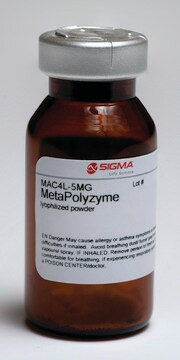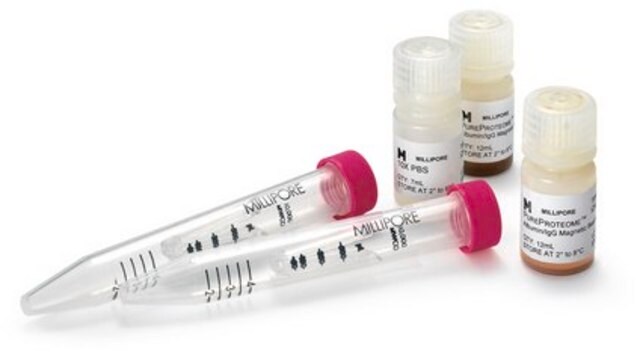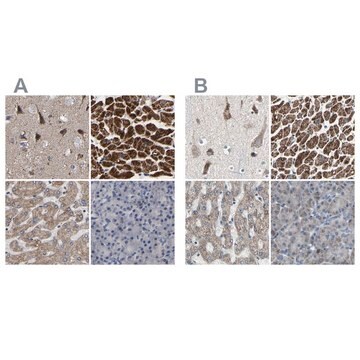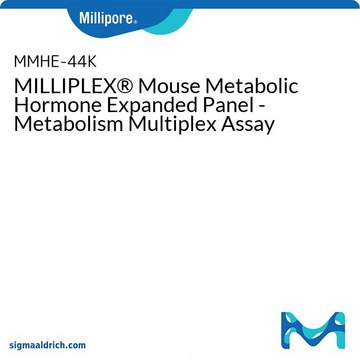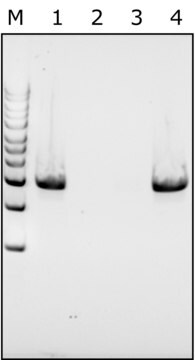Wszystkie zdjęcia(1)
Kluczowe dokumenty
MAC4LRI
MetaPolyzyme with RNase inhibitor
Lytic enzyme mixture for RNA extraction
Synonim(y):
Multilytic Enzyme Mix suitable for RNA isolation
Zaloguj sięWyświetlanie cen organizacyjnych i kontraktowych
About This Item
Kod UNSPSC:
12352204
Polecane produkty
Poziom jakości
Formularz
lyophilized powder
metody
DNA extraction: suitable
przydatność
suitable for microbiology
Zastosowanie
microbiology
Warunki transportu
wet ice
temp. przechowywania
-10 to -25°C
Opis ogólny
A common difficulty among microbiome scientists is to extract nucleic acids from difficult to lyse microbes that form capsules or highly resistant spores. Some microbes are difficult to disrupt because the cell walls may form capsules or resistant spores. To address this challenge, protocols that integrate lysing enzymes can be incorporated into the nucleic acid extraction workflow.
Zastosowanie
Isolating RNA from microbiome samples poses many challenges. RNA molecules are highly labile and are prone to degradation by contaminating RNases. As such, to adapt the MetaPolyzyme for RNA isolation, a broad range RNase inhibitor has been incorporated in order to help prevent RNA degradation by various RNases. MAC4LRI, includes all 6 enzymes from MetaPolyzyme to ensure maximal lysis of microorganisms while protecting the sample RNA from degradation. While it is not possible to inhibit all RNases from a specific microbial environment, we haver incorporated a proprietary RNase Inhibitor to help inhibit as many RNases as possible.
The MetaPolyzyme product family includes MAC4L, MAC4LDF (DNA-Free), SAEO200 (MycoPolyzme, for yeast and fungal lysis, DNA-Free) and MAC4LRI (RNase Inhibitor) and are based on a multi-lytic enzyme mixture formulated for effective lysis of microbiome samples from any sample type. Originally, MetaPolyZyme was developed by Scott Tighe for use on samples from extreme environments and general applications to increase DNA extraction efficiency for any method. To date, these products have been further evaluated and continuously developed in consultation and collaboration with the Association of Biomolecular Resource Facilities (ABRF) Metagenomics and Microbiome Research Group (MMRG; formerly the Metagenomics Research Group, MGRG). Several publications have cited use of MetaPolyzyme, suggesting various advantages to the usage of MetaPolyzyme for enhancing bacterial lysis.
The MetaPolyzyme product family includes MAC4L, MAC4LDF (DNA-Free), SAEO200 (MycoPolyzme, for yeast and fungal lysis, DNA-Free) and MAC4LRI (RNase Inhibitor) and are based on a multi-lytic enzyme mixture formulated for effective lysis of microbiome samples from any sample type. Originally, MetaPolyZyme was developed by Scott Tighe for use on samples from extreme environments and general applications to increase DNA extraction efficiency for any method. To date, these products have been further evaluated and continuously developed in consultation and collaboration with the Association of Biomolecular Resource Facilities (ABRF) Metagenomics and Microbiome Research Group (MMRG; formerly the Metagenomics Research Group, MGRG). Several publications have cited use of MetaPolyzyme, suggesting various advantages to the usage of MetaPolyzyme for enhancing bacterial lysis.
Cechy i korzyści
- Disrupts difficult to lyse microbe samples
- Protects RNA from degradation
Ta strona może zawierać tekst przetłumaczony maszynowo.
Hasło ostrzegawcze
Danger
Zwroty wskazujące rodzaj zagrożenia
Zwroty wskazujące środki ostrożności
Klasyfikacja zagrożeń
Resp. Sens. 1
Kod klasy składowania
11 - Combustible Solids
Klasa zagrożenia wodnego (WGK)
WGK 3
Temperatura zapłonu (°F)
Not applicable
Temperatura zapłonu (°C)
Not applicable
Wybierz jedną z najnowszych wersji:
Certyfikaty analizy (CoA)
Lot/Batch Number
Przepraszamy, ale COA dla tego produktu nie jest aktualnie dostępny online.
Proszę o kontakt, jeśli potrzebna jest pomoc Obsługa Klienta
Masz już ten produkt?
Dokumenty związane z niedawno zakupionymi produktami zostały zamieszczone w Bibliotece dokumentów.
Nasz zespół naukowców ma doświadczenie we wszystkich obszarach badań, w tym w naukach przyrodniczych, materiałoznawstwie, syntezie chemicznej, chromatografii, analityce i wielu innych dziedzinach.
Skontaktuj się z zespołem ds. pomocy technicznej
